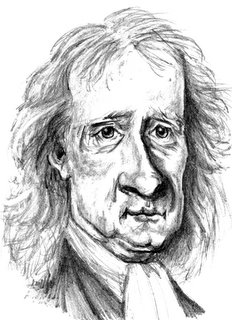God said, Let Newton Be!

"Nature and Nature's Laws lay hid in Night/ God said, Let Newton be! and all was Light." -- Alexander Pope.
For centuries he was the most influential scientific thinker in the Western world. Nevertheless, no person's right to intellectual significance has been more trivialized than Isaac Newton's, his memory unfairly relegated to the fable of a slightly dim-witted man sitting under an apple tree (someone who could be portrayed in Hollywood by Harpo Marx of all people).
Before Newton started his compulsive calculating, the physical universe was poorly understood, thought to be largely the province of chance, an undivinable mystery -- but afterwards, scientists were to view the universe and its changes as being shaped by laws which could be described mathematically.
Born to a modest household in Woolsthorpe, Lincolnshire, England on this date in 1643, his father died before he was born, but he managed to enter Trinity College, Cambridge in 1661 to pursue a law degree. There he quickly grew tired of Aristotelian philosophy and pursued the writings of Francis Bacon and Rene Descartes on his own. In 1664 he was selected to be a scholar at Trinity, which would have permitted him to work on his scientific ideas with a modest stipend, but soon thereafter Cambridge University closed down due to the Great Plague.
A disheartened Newton returned home to his mother, where he toiled away in obscurity, there inventing the foundations of differential and integral calculus, simple analytical methods for finding the values of areas, tangents, the lengths of curves and the limits of functions -- methods which have become indispensable to later physicists for solving problems. He also derived a universal law of gravitation and began to investigate the nature of light.
Upon his return to Cambridge in 1667, he was elected a fellow. In 1672 he impressed the scientific world with the first reflecting telescope. Later that year, he published his first scientific paper, "A New Theory About Light and Colours," in which he claimed that light consisted of small particles rather than waves, but his ideas were attacked by Robert Hooke, then the supreme scientist in England; always fearful and sensitive, Newton was personally distraught by Hooke's criticism, and did not publish a full explanation of his optical theory, which did employ waves to supplement his particle explanation, until after Hooke's death.
He spent the next years working alone on his theories when in 1684, encouraged by Edmond Halley (who was tired of Hooke's braggadocio), Newton scooped Hooke by explaining the apparently irregular motion of the planets by proving with his calculus that the planets moved in elliptical orbits. In his De motus corporum, he went on to extrapolate three laws of motion (that a body in motion moves with constant velocity unless acted upon by some force, and that a body at rest remains at rest unless acted upon by some force; that force equals mass multiplied by acceleration; and that every action evokes an equal and opposite reaction) and to articulate the law of gravity he had previously derived, that between any two bodies, the gravitational force is proportional to the product of their masses, and inversely proportional to the square of the distance between them.
Try getting that from a falling apple.
Halley persuaded Newton to write a full treatment of these principles, which became the Philosophiae naturalis principia mathematica (1687), universally recognized as the greatest scientific treatise ever written.
In 1693, the unmarried, skittish Newton suffered a nervous breakdown after a brief career in Parliament, and in 1696 gave up research to become an official with the Royal Mint. Meanwhile, in private he had compiled copious writings and investigations of alchemy, the mystical study of turning base metals into gold. It has perplexed scholars (including John Maynard Keynes, who purchased the papers some years later) that a man with as much as insight into the physical universe as Newton would fritter away so much of his life on a diligent and enthusiastic study of an illusion. While some apologize that Newton was attracted by the religious significance of alchemy and was striving for a synthetic understanding of the universe, it might also be observed that Newton's lack of self esteem would never let him be proud of his achievements in science, and that perhaps his guilt over having chosen a flimsy scientific career sought to be assuaged by a practical effect -- that his life choices would produce something which would actually change someone's life. His tortured innards would not let him see that he had already done just that.
Newton passed away on March 31, 1727 in London.
[For extra credit, here is a great site devoted to Newton's explorations in alchemy, with scans of his notebook pages. Via BoingBoing.]
Labels: Physicists





0 Comments:
Post a Comment
Subscribe to Post Comments [Atom]
<< Home